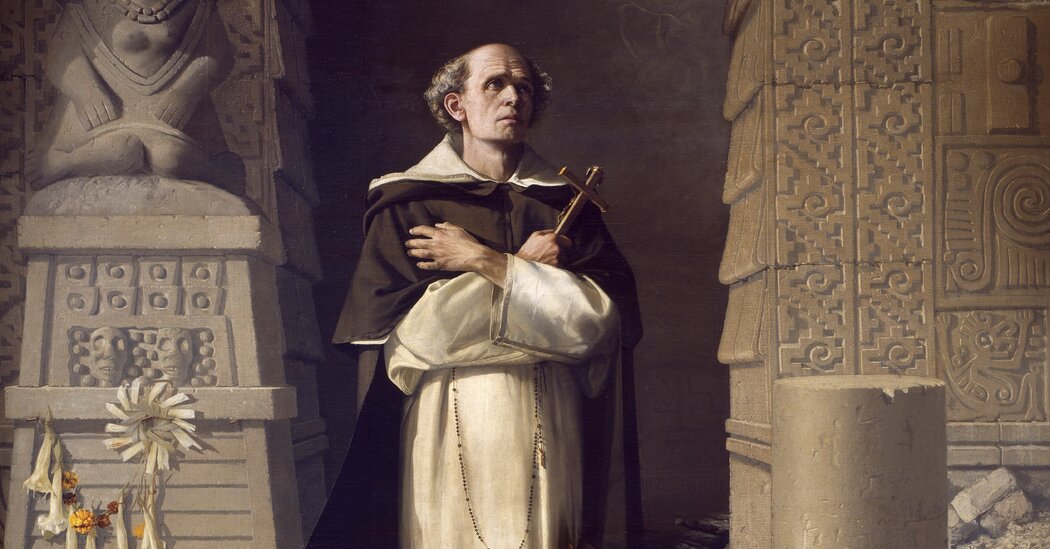AMERICA, AMÉRICA: A New History of the New World, by Greg Grandin
Remember, if you will, Jan. 20, 2025 — a date that already feels like ancient history as the country enters its 12th week of President Trump’s wild ride. Among the cascade of executive orders he signed that day was one that changed the name of the Gulf of Mexico to the Gulf of America. “The area formerly known as the Gulf of Mexico has long been an integral asset to our once burgeoning Nation and has remained an indelible part of America,” Trump declared. “Its natural resources and wildlife remain central to America’s economy.”
A couple of weeks later, the Yale historian Greg Grandin suggested that in at least one sense Trump may have been right. “If the intensive extraction of riches from a patch of nature bestows proprietary rights over that patch, then the gulf belongs to the U.S.,” Grandin wrote in The Guardian. “For more than a century, its industries have drilled, fracked and fished it to such an intense degree it’s a wonder there’s any oil, gas or seafood left to be had.” In other words, by defiling the gulf, we made it ours.
But Trump also assumed that the name “America” belonged solely to the United States. And on that point, Grandin has written a stirring new book suggesting otherwise. In “America, América,” he emphasizes a capacious understanding of those four syllables. He shows how over the course of five centuries, America in the north and America in the south have shaped each other through war, conquest, competition and cooperation. Their intercontinental relationship has had implications for not only the Western Hemisphere but also the modern world.
“America, América” is implicitly a companion volume to Grandin’s Pulitzer Prize-winning “The End of Myth,” which explored the role played by the frontier in the American imagination. Grandin posited that the mythology of an ever-expanding frontier encouraged fantasies of infinite growth and delusions of innocence. Instead of grappling with scarcity and contradiction, Americans learned simply to go west. He traced how the United States became “inured to its brutality and accustomed to a unique prerogative: its ability to organize politics around the promise of constant, endless expansion.”
South of the United States, a starkly different experience made for a different understanding of the world. In “America, América,” Grandin shows how Spanish Americans viewed frontiers not as escape valves but “as historic theaters of terror and domination.” He maintains that this sense of anguish gave rise to a strain of Latin American humanism that became foundational to ideals of international cooperation and global institutions, including the United Nations.
It’s a surprising argument on the face of it. The countries of Latin America have had their share of domestic conflagrations and ruthless military dictatorships. Grandin also has to contend with the so-called Black Legend, which depicted the Spanish empire as especially murderous and depraved — a stereotype that British imperialists invoked to make themselves seem “moderate” by comparison.
Grandin allows that the conquistadors were responsible for enormous bloodshed. But he goes on to say that it is precisely because of the vicious havoc they wreaked that they elicited outrage and dissent. He offers a rich, moving portrait of Father Bartolomé de Las Casas, a 16th-century Dominican priest who started out as a supporter and beneficiary of the Spanish crown’s imperial ambitions before becoming one of its most scathing critics. Las Casas’ conversion moment took place when he accompanied an expedition to pacify Cuba. He saw his fellow Spaniards disemboweling women and children. He would later remember “the land, covered in bodies.”
Las Casas wrote as a witness to atrocity: “so many massacres, so many burnings, so many bereavements and, finally, such an ocean of evil.” The Spanish empire had its prominent apologists, like Juan Ginés de Sepúlveda, who deemed Indigenous people deserving of subjugation. But Grandin says that we don’t pay nearly enough attention to “moral revolutionaries,” like Las Casas, who acknowledged that “Native Americans were humans, all humans were equal and no one was born a ‘natural slave.’”
Even as scholars in other parts of the world were elaborating a “new humanism,” Grandin says, Las Casas went one step further by hitching it to “the Catholic Church’s prophetic, communitarian tradition.” The resulting philosophy balanced individual rights with “the needs of the common good” — something Latin Americans have repeatedly tried to remind their northern neighbors of, even when the United States did not necessarily want to listen.
The rest of “America, América” follows this theme through the ensuing centuries, amid revolutions, civil wars and struggles for independence. Grandin explains how the Spanish Americans were so eager to give “Saxon” Americans the benefit of the doubt that they initially read the Monroe Doctrine of 1823 as confirmation of a collective struggle against European imperialism. But the United States would go on to cite the doctrine as “a self-issued warrant to intervene against its southern neighbors,” from the annexation of Texas through the end of the Cold War. “All told,” Grandin writes, “Washington had a hand in 16 regime changes between 1961 and 1969.”
Grandin is such a terrific writer and perceptive historian that I was swept along by his enthralling narrative. Yet his insistence on the indomitable spirit of Latin American humanism is so broad that it sometimes verges on the sentimental. When Washington’s leaders wanted to assert “America for America,” Latin Americans responded with “America for humanity,” he writes. “Latin America,” he announces toward the end of the book, “remains among the most peaceful continents in the world, in terms of state-to-state relations.”
In terms of domestic politics, though, it’s been an altogether different story. Grandin knows this, however reluctant he is to allow it to complicate his inspiring thesis. He contends that responsibility for the continent’s travails lies elsewhere, rightfully recounting how the United States propped up right-wing dictators like Chile’s Augusto Pinochet. He also blames an unfair system of international trade, noting that the continent’s social democrats “believe that the key to solving their own considerable domestic problems lies in their ability to revamp the global order.”
But all of the “to be sure” caveats can’t quite cover reality’s rough edges. Grandin has written so brilliantly about the perils of mythological thinking that it’s jarring to see him wrestle with his own.
AMERICA, AMÉRICA: A New History of the New World | By Greg Grandin | Penguin Press | 737 pp. | $35
Jennifer Szalai is the nonfiction book critic for The Times.
The post A Bold New History Highlights Latin America’s Humanist Ideals appeared first on New York Times.




